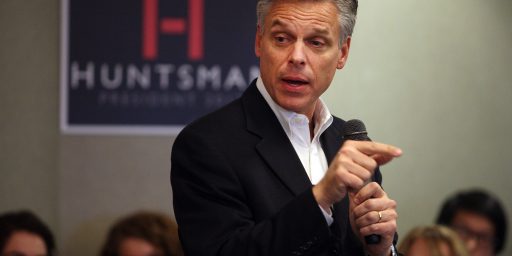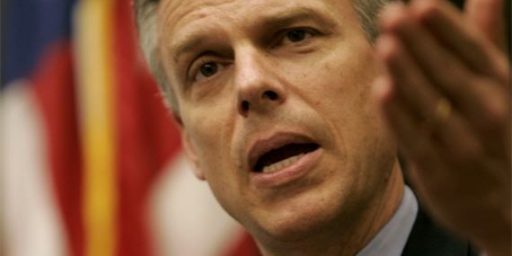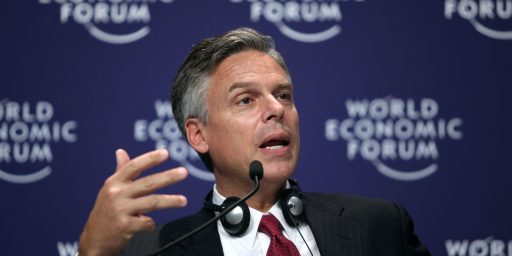Jon Huntsman: End Too Big To Fail
James Pethokoukis breaks news that Jon Huntsman is trying to differentiate himself from the pack with a bold new proposal on financial reform. He quotes extensively from a proposal not yet on the Huntsman website that declares:
We need banks that are small and simple enough to fail, not financial public utilities. Hedge funds and private equity funds go out of business all the time when they make big mistakes, to the notice of few, because they are not too big to fail. There is no reason why banks cannot live with the same reality.
The more detailed proposal:
1. Set a hard cap on bank size based on assets as a percentage of GDP. (This cap would be on total bank size, not using any of the illusory “risk-weights” currently central to thinking about bank accounting. The lowest risk assets for banks in Europe, supposedly, are sovereign debt—yet this very same debt is now at the heart of the current crisis.
2. We should have a similar cap on leverage—total borrowing—by any individual bank, relative to GDP.
3. Explore reforms now being considered by the U.K. to make the unwinding of its biggest banks less risky for the broader economy.
4. Impose a fee on banks whose size exceeds a certain percentage of GDP to cover the cost they would impose on taxpayers in a bailout, thus eliminating the implicit subsidy of their too-big-to-fail status. The fee would incentivize the major banks to slim themselves down; failure to do so would result in increasing the fee until the banks are systemically safe. Any fees collected would be used to reduce taxes for the broader non-financial corporate sector.
5. In addition, focus on establishing an FDIC insurance premium that better reflects the riskiness of banks’ portfolios. This would provide an incentive for banks to scale down, allowing the financial system to absorb them organically in the event of a collapse.
6. Strengthen capital requirements, moving far beyond what is envisaged in the current Basel Accord. The Accord is a mixture of regulatory oversight and political compromise. As a result, the U.S. has allowed its banking policy to be determined by the “least common denominator” among European and Asian countries, many with a long history of not being prudent.
I’ll take a page out of Herman Cain’s book here and wait until I’ve seen analysis from people more expert than I am on high finance before taking a definitive position on this. But it echoes what Dave Schuler and I have been saying now for more than three years: Too Big To Fail is Too Big To Exist. Either huge financial institutions are a viable business model whose shareholders bear all of the risks of bad decisions or they are not.
This proposal would seem to be aimed directly at the Tea Party. Rather clearly, with Sarah Palin declining to run and Michele Bachmann’s campaign having imploded, they don’t have a candidate. Can Huntsman fill the void? I doubt it. Then again, who’da thunk serial adulterer Newt Gingrich could become the candidate to rally Christian conservatives?






Traditional banking prior to the repeal of provisions of the Glass–Steagall Act by the Gramm–Leach–Bliley Act seemed to my layperson eyes as fairly safe (or at least the risks were understood and covered by reserve requirements / FDIC / etc).
I’m by no means an expert (disclosure: I worked for a top 3 financial services institution for 20+ years but in IT data warehousing). But it seems to me that the additional risk of linking investment banking with deposit banking has the advantage of increasing the leverage available to the investment house but at the potential risk of wiping out the whole combined bank.
I may be way off base – someone please educate me if I am.
Also, what are the risks and advantages of combining the plethora of fragmented financial regulatory agencies into one regulatory agency like most other developed nations?
Another question: are Huntsman’s proposals constitutionally kosher? The “relative to GDP” provisions seem initially sketchy to my non-lawyer eyes.
Actually, Bernie Sanders (yeah, a self-identifying socialist!) has been banging the meme too big to fail == too big to exist for YEARS.
Thank you Jon Huntsman! Finally, a Republican speaks up to limit the power of large, politically connected Wall Street banks. Obama got rolled by the bankers and Republicans in congress are still on their leash. Here’s hoping that Huntsman can break out in New Hampshire.
@Bob:
It would be nice, but I won’t be holding my breath.